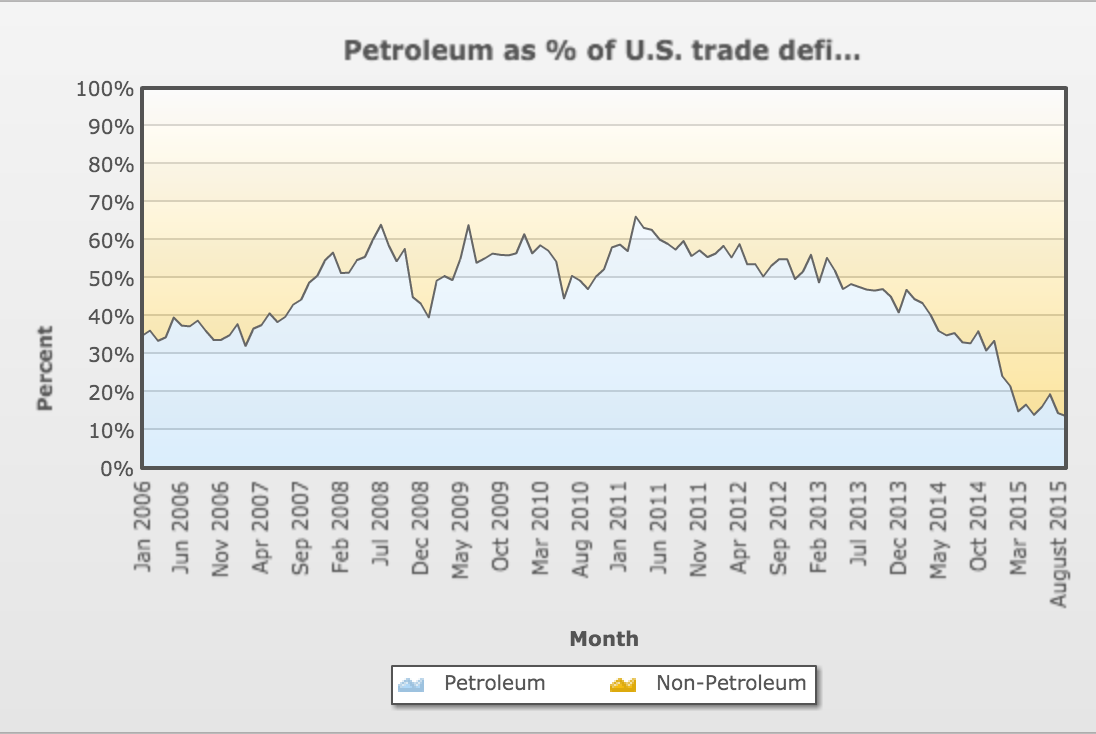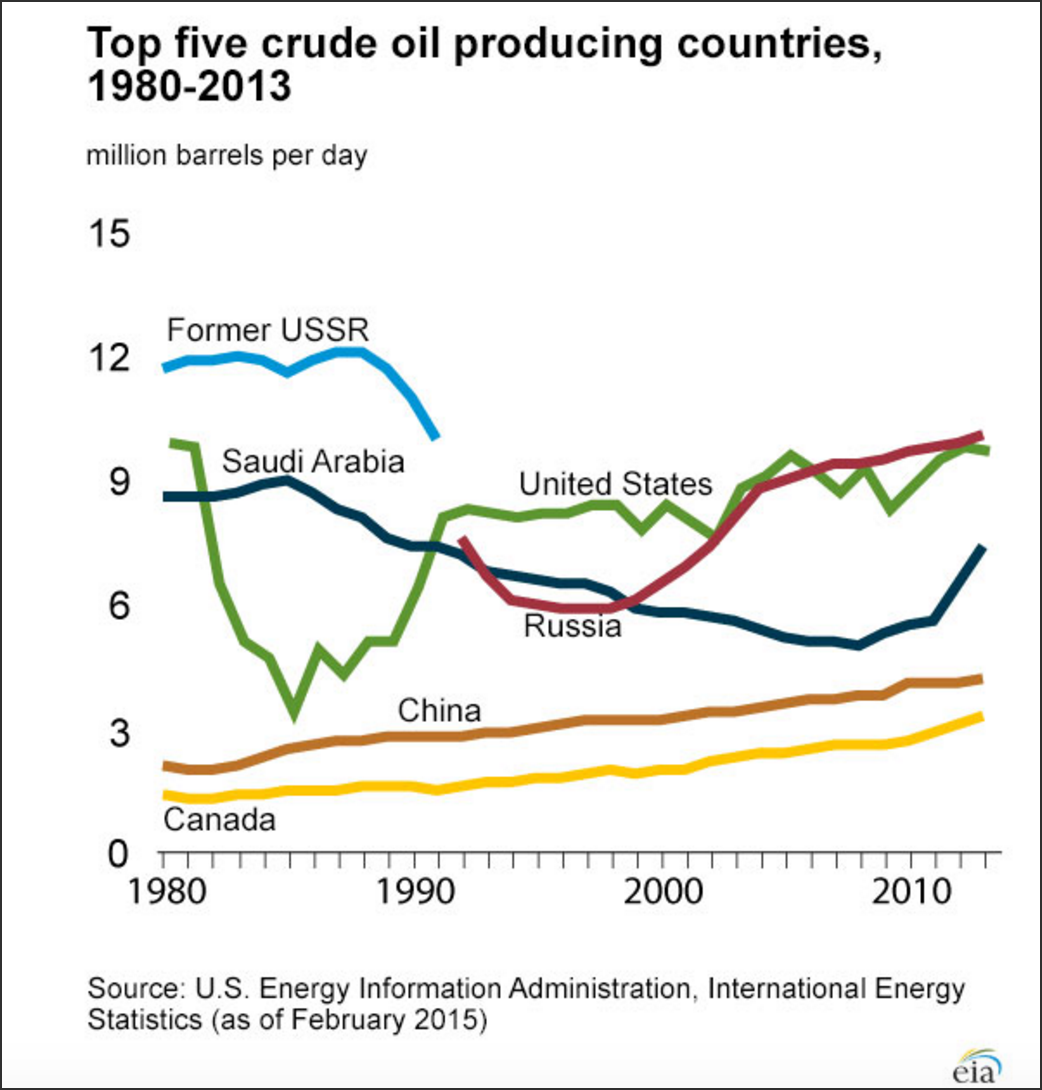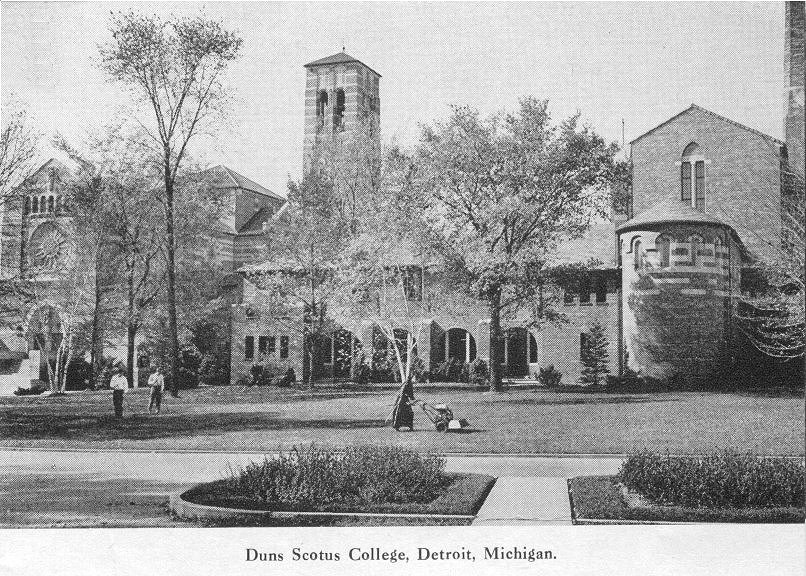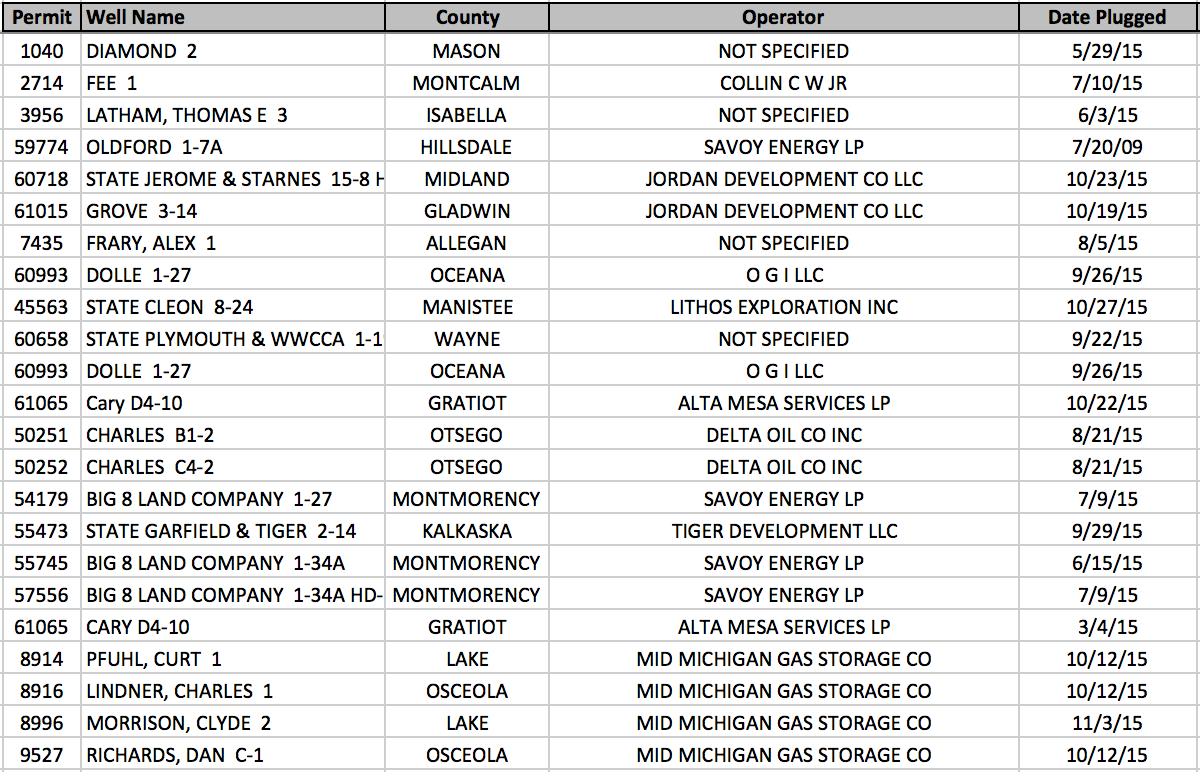Michigan has issued 104 permits so far this year through November 20, 2015 and continues its streak of the slowest 6 years in a row ever for oil & gas activity. 14 of the permits issued thus far in 2015 are for pilot & horizontal combinations and should really only count as one. The numbers through 2015 continue to support RMP’s forecasts and analysis of Michigan oil & gas activity. With only 104 permits issued in November, it’s still very likely 2015 will be the slowest year in Michigan oil & gas history. 1931 currently holds the record as the slowest year for permitting in Michigan history at 111 permits issued.

Michigan produces less than 5% of the refined oil products purchased by Michigan consumers. Michigan is ranked 19th in crude oil production in the United States out of 31 producing states. Collective US production of oil from all 31 producing states supplies about only half of the crude products US consumers purchase. The US only holds 2.2% of world crude oil reserves. Recent increases in US production of crude because of technological advancements in horizontal drilling and hydraulic fracturing are certainly remarkable and have made a large dent in imported petroleum, but we still only produce about half of the crude oil processed in US refineries. Oil as an energy source is simply not sustainable even at the currently boosted levels of production. The USA will perpetually remain in a trade deficit position with regard to crude oil production versus usage until the internal combustion engine is phased out of use. The math is so simple yet messages broadcast on our television sets attempt to mislead us into thinking just the opposite is true.
The US trade deficit related to crude oil & refined petroleum products from 2000 to 2012 has amounted to $2.87 trillion dollars or 40.5% of cumulative deficits in all goods and services over the period. The US trade deficit as it relates to petroleum stands at 13.7% as of September 2015. The EIA predicts that 100% of proven world crude reserves will deplete in the next 25 years if current consumption rates continue. The time to begin a responsible migration away from crude oil as an energy source is now. Migrating away from crude oil as an energy source is what’s best for our economy, our environment, our national security, and the future of our children. We will be dedicating more time and posts to demonstrating the link between oil & terrorism funding, military spending for protecting oil infrastructure & trade routes in hostile parts of the world, and debunking API propaganda that misleads the general public in order to preserve reckless spending of our tax dollars on oil’s energy monopoly over the transportation sector of our economy.

Saudi Arabia’s recent actions meant to disrupt American crude oil production and inroads into OPEC’s market share are weighing heavy on American oil producers because of the statistics mentioned above; this is true across the country, around the world, and here at home in Michigan. Houston based Marathon Oil Company, as a microcosm example, is currently exploring the Detroit River group of rocks in Crawford County & Clare County and they had better strike it big with their Michigan Basin exploration or it could be over before it even gets started. Marathon Oil announced earlier this month they would be cutting their dividend by 76% to protect cash flow by $425 million in 2016. In my day job, as a financial analyst, an unexpected dividend cut is generally considered a key indicator of future capital & development spending cuts. A large & unexpected dividend cut can also be a signal that American jobs will be cut in the next fiscal year. It continues to demonstrate and affirm what we have been reporting at RMP with data compiled from the EIA: the USA simply does not have the oil reserves to sustain production & revenue against more powerful world competitors. This is evident with more and more public data despite what is incessantly broadcast on your television by Jack Gerard’s API.
Marathon’s cuts are deeper and sooner than anyone expected and show the headwinds American shale producers are facing because of recent actions taken by the true CEO’s of the world crude market: King Salman bin Abdulaziz Al Saud of Saudi Arabia and his heir apparent Muhammed bin Nayef. The House of Saud’s actions have been executed to protect Saudi Arabia’s positions in world oil markets and they are working as planned; as the saying goes: it’s good to be the King. This could mean Marathon’s exploration in the Michigan Basin could be short lived and add to Michigan’s list of oil majors who have come to our basin, tried, failed, and exited. RMP supports all Michigan & American workers, including those in the oil industry, even as we advocate for the responsible migration away from oil as an energy source. We report about these truths of real world energy production to appeal to common sense citizens who agree it’s time we do what’s right for our economy and national security and begin a responsible migration away from oil as an energy source. We report this information as a sobering truth that it’s time to start investing in American energy production like clean coal and synthetic natural gas production that does not give advantages to the Saudis who continue to pour money into organizations related to jihadists and terrorist sympathizers that want to end our way of life. It may seem ironic to people who do not study economics, but we can create more sustainable and less volatile employment for America’s oil industry workers by responsibly migrating away from oil as energy source.

With all these tough to swallow numbers about the decline of the oil & gas industry in Michigan and the headwinds faced by other operators around the country, RMP moves forward with great confidence that the US can be 100% energy independent without oil and create more energy sector jobs for American workers by migrating away from oil and focusing on the manufacture of SNG. We hope that our legislators can see the writing on the wall and actually start to craft legislation that gives incentive to invest in new forms of energy that allow Michigan businesses to create jobs for all Michigan workers who seek employment and move us toward 100% energy independence. Michigan House Bill 4297 proposed by Rep. Nesbitt makes some good moves toward the manufacture of SNG but also has some lumps too. RMP will be dissecting HB4297 & HB4298 in future posts to explain what we think is terrific wording and what parts potentially fall short of promoting egalitarian free market capitalism.
Michigan oil & gas needs a miracle to turn around from the dismal numbers we continue to report. This month Michigan oil & gas reaches for help from a higher power with Traverse City based Jordan Development’s application for the Word of Faith 16-27 oil well. The Word of Faith 16-27 well pad is staked on property in Southfield at the old Duns Scotus College. The church was built in 1930 and was the college of the Friars Minor from 1930 to 1979. The building and campus at 9 mile & Evergreen is gorgeous. It’s surrounded by trees on all four sides and is a metro Detroit gem that received the Architectural Medal in 1930 from the Detroit Chapter of The American Institute of Architects.

The well pad applied for is 250ft x 250ft or 1.5 acres and roughly 330 feet north of 9 Mile Road. The well would have a vertical depth of 2,900 feet and target the Niagaran formation for production. The Word of Faith 16-27 will be a vertical well completed by acidizing, not by hydraulic fracturing. There are no Type 1 or Type 2a public water supplies within 2000 feet of the well, nor are there any Type 2b or Type 3 public water wells within 800 feet of the site according to the application. The stake locating where the well will be drilled is shown this month’s featured image. The church tower can be seen through the deciduous trees in November and the drilling rig will most likely be visible through the trees from 9 Mile Road. The well pad will consume 1.5 acres of the wooded area between 9 Mile Road and the Church buildings as can be seen in the pad diagram of the application.

The Lord has been good to Keith Butler, the current owner of the Word of Faith Ministries, as Southfield records show his ministry was able to purchase the Duns Scotus property and buildings for $4 million and most likely paid cash. He has a limousine on campus. He is said to own over 80 different ministries and properties around the country and is said to have paid cash for all of them including his $1.3 million dollar home in Troy, Michigan. Keith was formerly a Detroit City councilman and the only Republican elected to the council since before World War II. Keith is currently a Republican committeeman and you may remember him from 2006 when he sought the Republican nomination for the US Senate to run against Debbie Stabenow. Keith lost the primary to Oakland County Sheriff Mike Bouchard who lost to Stabenow. RMP, like we always do, will keep an eye on the Word of Faith 16-27 well just like the other 65,000 odd wells in our Michigan congregation.
Now let’s take look at other Michigan oil & gas activity that occurred in November 2015:
It was the slowest applications and permits month so far this year in what is likely to be the slowest permitting year in Michigan’s oil & gas history. Unless the MDEQ issues 7 more permits in December it will be officially the slowest permitting year in Michigan history. Unless the MDEQ issues 21 permits in December, it will still technically be the slowest year in Michigan history when we adjust for 14 permits that are paired combinations of vertical & horizontal wells.

In October we heralded the official end of the Collingwood era in Michigan and this month we do the same with the A1. Even while WyoTex has some permits in Grand Traverse county that were issued in 2015, the Swanson Trust 1-1 HD1 well permit expiring this month is more evidence that it is simply not economical to drill exploratory wells into Michigan’s A1 formation. Every single operator that has targeted Michigan’s A1 has failed. There are zero success stories for operators targeting the A1. The A1 was the very first target of HVHF in Michigan in 2008. We will keep our eyes on the A1 permits issued to WyoTex in Grand Traverse county and most likely report two years from now that they have also expired with no activity similar to the Swanson Trust 1-1HD1.

Other notable activity in November 2015 is that the State Jerome & Starnes 15-8HD1 was reported plugged on 10/23/2015. We seem to have data each month that signifies the end of HVHF in Michigan. The State Jerome & Starnes 15-8HD1 was a HVHF well drilled and completed by Jordan Development in Midland county in 2013. It produced 1,071 barrels of oil over the course of 5 months before being shut in. It is now plugged.
Apollo Exploration & Development out of Mount Pleasant Michigan became the operator of record for 14 wells in Saint Claire County. We will watch this development as this is something new in Michigan oil & gas and could signify renewed interest near Port Huron along the 1-94 corridor.
The story we are most interested in watching in Michigan oil & gas continues to be Core Development’s CO2 injection activity. Core applied for a well status change to turn the Borowiak 2-6 well (PN 59237) near Gaylord into a CO2 injection well. Core also took ownership of 4 more wells in Bagley Township in Otsego county that we will continue to watch in the coming months. RMP’s mapping capabilities continue to make great strides and we will soon do some more in depth reporting on Core’s CO2 injection wells and show you where they are on the map. We will also try to explain more about what CO2 injection is and why it is important. CO2 sequestration will be an important part of America’s initiative to do our part to address climate change. Sequestration technology like that being employed by Core will be something important the whole world can learn from operators here in Michigan. Sequestration tech will be important to try to keep the world’s atmosphere at or below 450ppm of atmospheric CO2.
November 2015 – List of New Oil & Gas Well Applications
Michigan received 4 applications this month and all were for oil. One of the applications was the Word of Faith 16-27 in Southfield Michigan which is this month’s featured story. Southfield has recently passed a 180 day moratorium on oil & gas extraction because of environmental concerns but the city’s actions are completely moot as the city has no jurisdiction. Southfield’s mayor, Donald Fracassi, has said the city has to do some investigation before allowing Jordan to drill but he technically has zero authority to do anything to stop any portion of the process should push come to shove.

November 2015 – List of Permits Issued for Oil & Gas Wells
In November 2015, Michigan issued 2 permits for wells. Both permits were for oil wells. At the risk of sounding like a broken record, oil & gas activity in Michigan is literally the slowest it’s ever been.

November 2015 – Oil & Gas Wells Published as Plugged
23 oil & gas wells wells were reported plugged in November including the State Jerome & Starnes 15-8 mentioned above. Plugged wells, as a ratio to permitted wells, a KPI we track each month, is now trending closer to 3:1 whereas it was closer to 2:1 earlier in the year.

The November 2015 Apps to Plugs Ratio KPI:
The apps to plugs ratio is self explanatory. By looking at the number of applications to wells plugged KPI we can see wells coming vs wells going. This KPI along with the previous one supports our original 2014 & 2015 outlook post with more numbers and data.
2015 Apps to Plugs Ratio KPI:
93 Applications : 268 Wells Plugged
The November 2015 Permits to Plugs Ratio KPI:
The permits to plugs ratio is nearly the same as the apps:plugs ratio but with permits instead of applications.
2015 Permits to Plugs Ratio KPI:
104 Permits Issued : 268 Wells Plugged
RMP is a non-profit organization similar to a church in that we are both 501(c)3 organizations. RMP’s religion, as an organization, is to perform public service that, in our belief, is best for our fresh water resources, our economy, and our national security. RMP has faith that right makes might. And, in that faith, RMP will to the end dare to do our public service duties as we understand them.
Even though RMP advocates for the responsible migration away from oil, we support Michigan oil workers and American workers in the oil industry. Please be careful to note this important point in this piece and every post ever published on this website. While RMP may hit hard with the analysis and medicine we believe can make our country stronger, we never hit below the belt. We honor dissenting points of view and we encourage healthy and civil debate about these topics that are so important to our economy and environment and our children’s future.
Thank you for reading the November MOGM and we’ll see you next month. Click on any of the thumbnail images below to open them in a gallery. Just click the right or left arrows to continue scrolling through the pictures.













Matt, thanks for this informative–and “enlightening” edition of MOGM. I’ve certainly come to regard your website as the bible of Michigan oil and gas activities.
As far as the dramatic decline in oil and gas development, on one hand, I’m happy to see it because I’m very environmentally conscious and don’t want to see contamination of our beautiful state. Plus, I don’t have a lot of faith in the MDEQ to protect it. I’m convinced that they are far more concerned about smoothing the way for oil companies to drill than they are about ensuring that our state lives up to its Pure Michigan label. On the other hand, I hate to see us suffer on the economic side because of the decline in mineral development. So, it’s a mixed bag for me.
On a side note, a friend of mine (who’s since passed) was a Franciscan friar and lived at Duns Scotus for a number of years during the 90s. I had a chance to visit him from time to time and can attest that the facility and property were something to behold. I would always enjoy strolling the beautiful ground while chatting with him.
Thanks again, Matt, and keep up the great work!
Steve
Thanks Steve. Your continued support is very much appreciated.
As a neighbor living within 500 feet from the proposed well head, I can say, this incredible affront to the residents of this area won’t be tolerated.
Our various residential insurers have told us we are not covered due to potential damages caused by drilling. Nor are we prepared to endure the endless lines of vehicles coming and going from the property, the chemicals injected into the well, the smell, and potential earthquakes, not to mention the loss in property values is unacceptable.
Local residents, as well as the City of Southfield mayor and council oppose any drilling in our community. And although we’re well aware of the recent changes in laws governing drilling and fracking at the state level remove many of our rights in this regard, we have the private funding, the media contacts, and the resolve to stop this.
“Word of Faith” has been a negative influence in our neighborhood for some time. The woods lining the 9 Mile Road and Evergreen Road sides of their property are constantly trash strewn, and the acres of asphalt paving around the buildings came about at the expense of thousands of trees.
We are galvanized to stop this, no matter what it takes, and have retained counsel.
If what you say in the article is true, why the push for export of American drilled oil? That is contrary to everything you write. Why should one ounce of American produced oil leave if we are still importing? Just more of the bs slander the oil and gas industry promotes. And the well in Southfield? A travesty. No residential area should ever be drilled. Not ever. The Flint water fiasco is solid proof that MDEQ is not only incompetent, they are corrupt and the principals should be facing prosecution for poisoning the people of Flint. Bottom line, we the people will not stand for the rape of our hard earned property so a few in the O+G industry can profit
Jay, thank you for reading. I appreciate all points of view and civil debate about issues effecting Michigan’s and America’s economy. I argue for the responsible migration away from crude oil as an energy source and against the expansion of non-critical oil & gas infrastructure in America; I have never “pushed” for the export of oil. My post about the Keystone XL pipeline is the most popular post on this blog and argues specifically against the expansion on non-critical oil & gas infrastructure in America and also the responsible migration away from crude oil as an energy source as does every post on this blog. I have spent much time trying to understand how energy production & distribution works globally, nationally, state-wide, and locally. I, however, do not write the laws or pass the laws. That happens in the legislative branches & executive branches of our government. I’m just a father that works all day and blogs about water conservation through sustainable energy production in my free time. I will make a more impactful difference for the betterment of global water conservation if this organization ever receives funding to work full time on what I care most about: protecting our fresh water natural resources for future generations.
While I support an immediate and responsible migration away from crude oil as an energy source, I unfortunately still drive an obsolete car that is powered by refined crude oil and I depend on it for transportation. Most of the cars I see on the road today are also burning gasoline or diesel. So, when I argue for responsibly migrating away from crude oil as an energy source, I do so with an understanding that oil will be around for decades to come and after my death even if we start in earnest to build fuel cell electric vehicles that can be powered by H2 which can be split from water using electrolysis or by using pyrolysis to turn garbage into energy and inert waste with little to no atmospheric emissions. My solution is to advocate for adoption of fuel cells which is the main theme of this blog & promoted throughout the body of this organization in every post. This transformation of the entire global energy sector of our economy will be challenging and take years to implement but it will work on a local, national, and global scale and is sustainable and retires fossil fuels to antiquity. I don’t do what I do necessarily assuming it will all be accomplished in my lifetime. I founded this organization and its sentiment so that it may be a legacy for my children and generations that come after me. I ask, what is your solution to make sure we have sustainable energy without putting men & women out of jobs and also keeps our transportation sector moving, gets our food to market, and keeps our factories building the things that make our standard of living high?
Something I’ve learned since founding this Michigan 501(c)3 organization dedicated to water conservation through sustainable energy production is that the distribution of crude oil is mainly done by marine vessel, pipeline, or rail-car in the global & national economy. Refined oil (i.e. gasoline, diesel, &c.) mostly moves by pipeline, rail-car, & truck on the local level through cities and townships to get to storage tanks where people fill up their cars and trucks or factories where petroleum based items are manufactured. Much of the imported crude oil that comes by marine vessel is not economically transported inland over a far distance. On the other hand, much of the crude oil produced inland is not economically transported to sea port efficiently. So, if you go back and read carefully, you will see that I talked about a potential silver lining to the oil export ban being lifted, I did not “push” for oil exports as you said. I will soon write a post explaining this in further detail, but the general point I intend to make is that exporting crude oil may allow America to switch its transportation fleet to FCEVs while slowly winding down American production capacity and allowing oil workers to keep their jobs while we responsibly migrate away from crude oil as an energy source, wind down our imports of oil to zero, improve our economy, and improve our national security. Please note that I did not “push” for the export of oil.
With regard to your comment about the MDEQ I agree and disagree. To the extent information was obfuscated or denied and can be proved in a court of law, I agree criminal prosecution is in order. I founded this organization because I believed I was being misled by the MDEQ with regard to Hydraulic Fracturing (HF). I was repeatedly told that HF had been done in Michigan for many years and was misled to believe that an Antrim well completed with HF was for the most part the same thing as a Collingwood well completed with HF. This misleading information about hydraulic fracturing was being broadcast nationally by the API as well as shill groups like Energy In Depth. It was not just the MDEQ where I was receiving conflated information. I have been collecting data with all my free time for the past five years since I was provided what I consider misleading information about hydraulic fracturing from officially authoritative sources. With all the data collected and time spent analyzing and parsing it, I can tell you a Michigan Antrim well is nothing like a Michigan Collingwood well. I’m prepared to argue this point with any government official, professional geologist, or paid shill. My analogy used in December 2015’s MOGM is valid in that I would describe a mouse and a blue whale as two very different things whereas the message I was receiving from the MDEQ’s Brad Wurfel was basically to say a mouse and a blue whale are both mammals and therefore they’re the same. It motivated me to dedicate myself to fresh water conservation and the oversight of governmental institutions funded with tax dollars earned from my day job that are supposed to protect us.
When Brad Wurfel said “Let me start here – anyone who is concerned about lead in the drinking water in Flint can relax” in July of 2015, I tweeted out that quote from the Detroit Free Press on RMP’s twitter account on 12/30/2015 the very day he and Dan Wyant were no longer employed by the MDEQ. Brad’s the same mouthpiece that in essence told me a mouse is the same thing as a blue whale because they’re both mammals. If anyone, in any hall of government, or paid with a public tax dollar tries to mislead the public, I will always do my best to use RMP to call that person out and use data to support my argument. That will never change.
But, I disagree with you in the sense that you refer to the MDEQ as if it were a person. The MDEQ is not a person, it’s an entity with many people and many divisions. Most of the people I have ever met or exchanged information with at the MDEQ over the course of the five years I have been working hard to learn MDEQ, MDNR, and MSPC data systems have been stand out individuals with solid ethics. To “throw the baby out with the bathwater” is a rash approach that is unreasonable and I disagree with its sentiment. I believe any individuals within any public organization guilty of obfuscating or misleading the public while children were being poisoned should be fair game for criminal prosecution.
Thank you for reading and thank you for your comment. RMP is one of the only Michigan based environmental organizations with a website that allows the public to leave comments as far as I know and we are basically unfunded. We appreciate you dropping by to leave a comment. I will not always be able to respond to all comments but I was glad to be able to respond to you today. I appreciate your spirit of wanting to do what you believe is right for Michigan and I hope you will take civil action to support legislation that you think will make Michigan a better place.
I applaud your efforts sir. My dealing with both of the MDEQ people you
Mention is they were 100% on the side of the oil and gas industry and they always had a very condescending tone in all written communication. In addition, Mr Wyant contacted the company I work for and suggested I be fired for using my work email in communicating with MDEQ. Bottom line is they work for the citizens of Michigan, not for the O+G industry. Keep up the good work. About exports, what I was writing about is the O+G industry pushing for exports, not you.
Very Good. Thanks Jay. I understand your frustrations and have had very similar ones when I first began trying to understand Michigan public data. I have also encountered situations where it seems as though MDEQ personnel seem work for the oil & gas industry and not Michigan taxpayers. I have a photograph of Hal Fitch & MOGA President Erin McDonagh toasting a drink and fraternizing at a MOGA event. I consider the photo disappointing because it’s a top MDEQ oil & gas official giving the appearance that he’s socializing with people he’s supposed to be regulating from an arm’s length. On the other hand, Michigan’s Department of Natural Resources has a rich history and smart geologists who have collected a body of education throughout decades. This ever growing body of Michigan natural resource data allows RMP to understand the lay of the land and chart out the smartest course for Michigan’s environmental and economic future. The MDEQ provides the information RMP depends on, so in that regard RMP supports the MDEQ mission. RMP tries to provide public oversight if malfeasance is evident or suspected but supports so many good men & women working at the MDEQ.